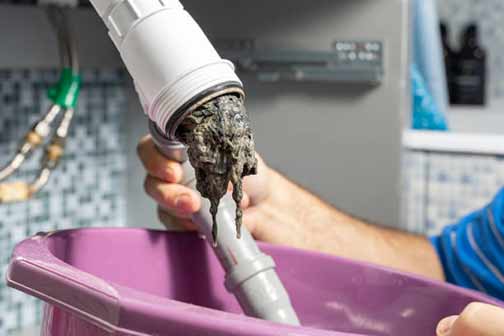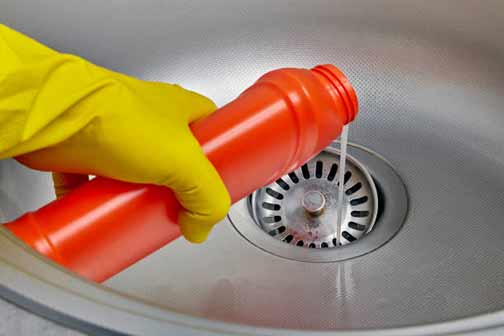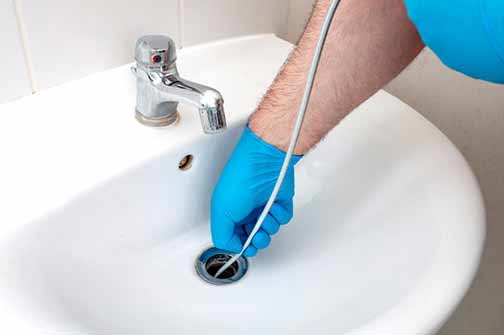
Blocked drains in your home can be stressful and frustrating. Imagine trying to shower, but dirty water is steadily pooling around your feet inside the cubicle, or pouring water into a kitchen sink and watching it fill up instead of emptying into the drain.
When you have a blocked drain in your home, the only thought is how to get it flowing again. Whatever offers a quick and easy fix is highly welcome in those circumstances. That is why chemical drain cleaners are such a popular option, says Archstone Properties.
But do chemical drain cleaners clean your drain? Yes, they may restore the flow of water through the pipes, but is this because they remove the debris inside the drain? The short answer is NO; chemical drain cleaners DO NOT clean your drains.
Instead of cleaning your drain line, chemical drain cleaners may harm your plumbing. However, it is hard for most homeowners to understand this because their drains usually start flowing again after they use a chemical drain cleaner. So, how are chemical drain cleaners bad for your drains?
How chemical drain cleaners work
Chemical drain cleaners contain highly corrosive substances. The principal means by which they dissolve the clogs inside a blocked pipe is by generating a lot of heat. The heat generated by the chemical drain cleaner burns a hole through the clog to restore the flow of water.
But this process has unintended consequences. The debris clogging the pipe is not removed. Instead, it is left behind inside the pipe, where it continues to build up and causes more blockages. Frequent use of chemical drain cleaners will eventually cause worse drain clogs.
Secondly, the intense heat from chemical drain cleaners can warp PVC pipes. If your drain pipes become twisted and weak due to using chemical drain cleaners, your drain line will be more likely to leak, and the system will clog more often.
Thirdly, the corrosives and acids in chemical drain cleaners are usually heavier than water. This is why they can sink through water to reach the site of a clog. But it also means they settle at the bottom of pipes instead of flowing away with the water. This creates big problems.

Effects of Chemical Drain Cleaners
They damage plumbing finishes: If they ever come into contact with plumbing finishes such as chrome, brushed nickel, polished brass, etc., chemical drain cleaners will damage them. The acids or caustic substances in the cleaner will eat the finish right off the fixture.
They hurt your drain pipes
If your home has cast iron drain lines, it would be a huge mistake to use chemical drain cleaners. They will only speed up the corrosion of your drain line. PVC pipes are also damaged by the heat these cleaners generate. If the residue of chemical drain cleaners sits inside your drain for a long time, it can weaken the pipes.
They encourage clogs and blockages
Chemical drain cleaners may coat pipe walls with a sticky residue. This traps more debris inside the pipe, making the original problem worse. Even worse, getting rid of this chemical residue is dangerous and expensive.
They harm the environment
Everything you put into your sink or shower drain somehow finds its way into nature or the treatment plant. Either way, we all pay for it through the high cost of purifying that water or the cost of a damaged environment.
They can harm your plumber
When you call a professional plumber to fix the problem inside your drain (as you eventually have to), the chemical cocktail inside your pipe can cause burns or even blindness if it splashes on the plumber’s skin or into his eyes.

Alternatives to chemical drain cleaners
Instead of using chemical drain cleaners in your home, you should do the following:
Watch what you flush
Do not put anything except water, toilet paper, and human waste into your toilet. Even if an item is labeled flushable, do not flush it down the toilet.
Dispose of FOG properly
Never pour fats, oil, and grease (FOG) into your kitchen sink. They congeal into a hard, sticky mass that traps debris and blocks your drains.
Put food waste in the trash
Scrape leftovers into the trash can. Do not pour starchy foods, stringy veggies, coffee grounds, eggshells, and cat litter into the drains.
Install strainers
Installing strainers on drain openings will keep hair, soap scum, food particles, and other debris out of the drains.
Use mechanical drain cleaning
Mechanical drain cleaning options like drain snakes and plungers are much safer compared to chemical drain cleaners.
Lastly, whether you have a clog or not, you want to have a professional plumber clean your drains at least once a year. A professional hydro jetting service or sewer rodding your drainage system helps to prevent clogs. This will make the use of chemical drain cleaners completely unnecessary.

